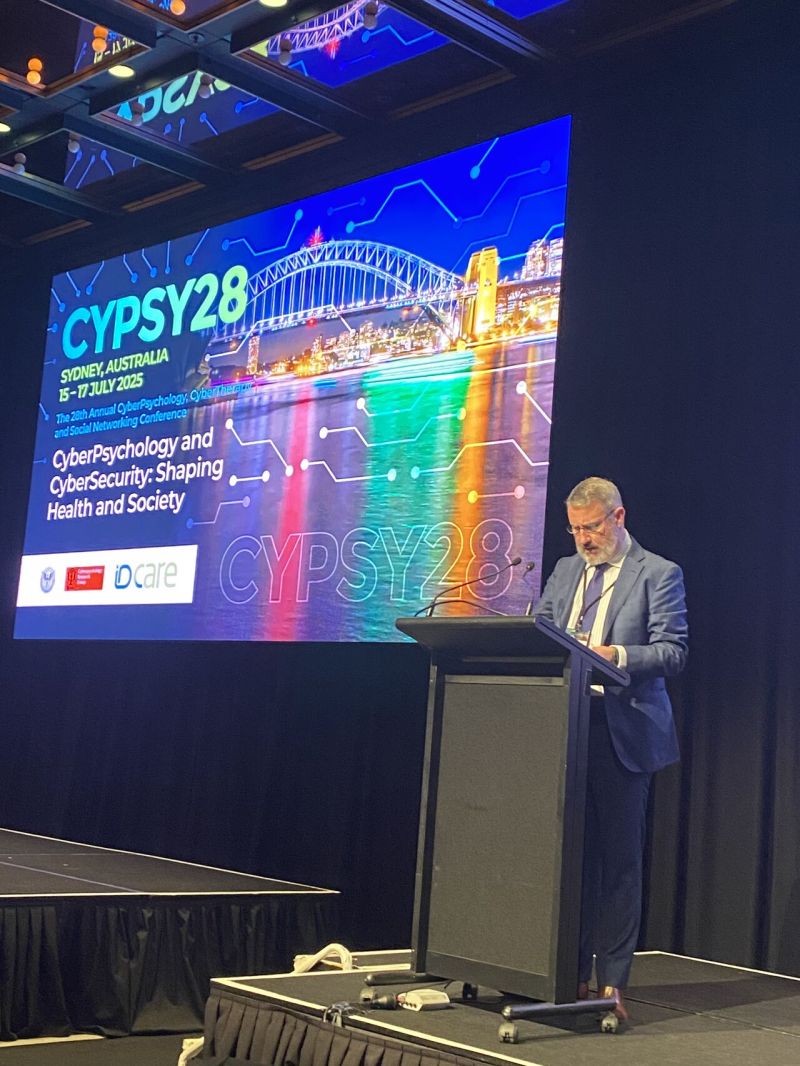News & Events
CyberPsych Series: Understanding Scam Compliance and Supportive Disengagement Strategies
November 21, 2025

Join a public seminar hosted by the IDCARE Foundation’s Cyberpsychology Support Centre lead, Associate Professor Brad Ridout.
Lifetime Achievement Award: Professor Monica Whitty and her contributions to cyberpsychology
July 30, 2025

We’re thrilled for Professor Whitty with this international recognition of her ongoing work and leadership in the field of cyberpsychology.
CyPsy28: 28th International Cyberpsychology Conference, July 2025, Sydney, Australia
July 15, 2025

This event was held between 15 to 17 July, 2025 in Sydney, Australia, and was a terrific success. Thankyou to all who attended.
Advancing Research and Education
The Foundation maintains a list of relevant research outputs that seek to advance knowledge about cyberpsychology, cyber security, serious harms and their treatment. Below is a list of research papers published by Foundation College of Expert members and other academics for public consumption and practicioner professional development.
Carminati, J. Y., Wiley, J. F., Ponsford, J., & Gould,K. R. (2025). The perfect storm of Cyberscam risk: examining personal, injury, and psychosocial risk factors for people with and without acquired brain injury. Cyberpsychology, Behavior, and Social Networking, 28 (4),275-283. https://doi.org/10.1089/cyber.2024.0435
Balcombe, L. (2025). The mental health impacts of internet scams. International Journal of Environmental Research and PublicHealth, 22, 938. https://pmc.ncbi.nlm.nih.gov/articles/PMC12192844/
Lacey, D., Campbell, A., Goode, S., & Ridout, B. (2024).The Cyberpsychology of Deception: A Mini Review of the Psychological Factors Influencing Scam Compliance. Annual Review of Cybertherapy And Telemedicine 2024, 34. https://emilywall.github.io/media/papers/MemoryCyPSY24.pdf#page=29
Koning, L., Junger, M., & Veldkamp, B. (2024). Risk factors for fraud victimization: The role of socio-demographics, personality ,mental, general, and cognitive health, activities, and fraud knowledge. International Review Of Victimology, 30 (3), 443-479. https://doi.org/10.1177/02697580231215839
Gould, K. R., Carminati, J. Y. J., & Ponsford, J. L. (2023). “They just say how stupid I was for being conned.” Cyberscams and acquired brain injury: A qualitative exploration of the lived experience of survivors and close others. Neuropsychological Rehabilitation, 33 (2),325-345. https://doi.org/10.1080/09602011.2021.2016447
Shang, Y., Wu, Z., Du, X., Jiang, Y., Ma, B., & Chi, M. (2022). The psychology of the internet fraud victimization of older adults: Asystematic review. Frontiers In Psychology, 13, 912242. https://doi.org/10.3389/fpsyg.2022.912242
Wen, X., Xu, L., Wang, J., Gao, Y., Shi, J., Zhao, K., ...& Qian, X. (2022). Mental states: A key point in scam compliance and warning compliance in real life. International Journal Of Environmental Research And Public Health, 19 (14), 8294. https://doi.org/10.3390/ijerph19148294
Whitty, M. T. (2020). Is there a scam for everyone? Psychologically profiling cyberscam victims. European Journal on Criminal Policy and Research, 26 (3), 399-409. https://doi.org/10.1007/s10610-020-09458-z
© The Author(s), under exclusive licence to Springer Nature Switzerland AG 2025. This is the author’s version of the article. The final authenticated version is available online via the DOI link above.
Lacey, D., Goode, S., Pawada, J., & Gibson, D. (2020). The application of scam compliance models to investment fraud offending. Journal of Criminological Research, Policy and Practice, 6 (1), 65-81.
https://doi.org/10.1108/JCRPP-12-2019-0073
© Springer Nature Limited. This is the author’s version of the article. The final published version is available at the publisher’s website via the DOI link above.
Montañez, R., Golob, E., & Xu, S. (2020). Human cognition through the lens of social engineering cyberattacks. Frontiers In Psychology, 11, 1755. https://doi.org/10.3389/fpsyg.2020.01755
Coluccia, A., Pozza, A., Ferretti, F., Carabellese, F.,Masti, A., & Gualtieri, G. (2020). Online romance scams: relational dynamics and psychological characteristics of the victims and scammers. Ascoping review. Clinical Practice And Epidemiology In Mental Health: CP& EMH, 16, 24. https://doi.org/10.2174/1745017902016010024
Whitty, M. T. (2019). Predicting susceptibility to cyber-fraud victimhood. Journal of Financial Crime, 26 (1),277-292. https://doi.org/10.1108/JFC-10-2017-0095
Norris, G., Brookes, A., & Dowell, D. (2019). The psychology of internet fraud victimisation: A systematic review. Journal of Police and Criminal Psychology, 34 (3), 231-245. https://doi.org/10.1007/s11896-019-09334-5
Whitty, M. T. (2018). Do you love me? Psychological characteristics of romance scam victims. Cyberpsychology, Behavior, And Social Networking, 21 (2), 105-109. https://doi.org/10.1089/cyber.2016.0729
Carminati, J. Y., Wiley, J. F., Ponsford, J., & Gould,K. R. (2025). The perfect storm of Cyberscam risk: examining personal, injury, and psychosocial risk factors for people with and without acquired brain injury. Cyberpsychology, Behavior, and Social Networking, 28 (4),275-283. https://doi.org/10.1089/cyber.2024.0435
Balcombe, L. (2025). The mental health impacts of internet scams. International Journal of Environmental Research and PublicHealth, 22, 938. https://pmc.ncbi.nlm.nih.gov/articles/PMC12192844/
Lacey, D., Campbell, A., Goode, S., & Ridout, B. (2024).The Cyberpsychology of Deception: A Mini Review of the Psychological Factors Influencing Scam Compliance. Annual Review of Cybertherapy And Telemedicine 2024, 34. https://emilywall.github.io/media/papers/MemoryCyPSY24.pdf#page=29
Koning, L., Junger, M., & Veldkamp, B. (2024). Risk factors for fraud victimization: The role of socio-demographics, personality ,mental, general, and cognitive health, activities, and fraud knowledge. International Review Of Victimology, 30 (3), 443-479. https://doi.org/10.1177/02697580231215839
Gould, K. R., Carminati, J. Y. J., & Ponsford, J. L. (2023). “They just say how stupid I was for being conned.” Cyberscams and acquired brain injury: A qualitative exploration of the lived experience of survivors and close others. Neuropsychological Rehabilitation, 33 (2),325-345. https://doi.org/10.1080/09602011.2021.2016447
Shang, Y., Wu, Z., Du, X., Jiang, Y., Ma, B., & Chi, M. (2022). The psychology of the internet fraud victimization of older adults: Asystematic review. Frontiers In Psychology, 13, 912242. https://doi.org/10.3389/fpsyg.2022.912242
Wen, X., Xu, L., Wang, J., Gao, Y., Shi, J., Zhao, K., ...& Qian, X. (2022). Mental states: A key point in scam compliance and warning compliance in real life. International Journal Of Environmental Research And Public Health, 19 (14), 8294. https://doi.org/10.3390/ijerph19148294
Whitty, M. T. (2020). Is there a scam for everyone? Psychologically profiling cyberscam victims. European Journal on Criminal Policy and Research, 26 (3), 399-409. https://doi.org/10.1007/s10610-020-09458-z
© The Author(s), under exclusive licence to Springer Nature Switzerland AG 2025. This is the author’s version of the article. The final authenticated version is available online via the DOI link above.
Lacey, D., Goode, S., Pawada, J., & Gibson, D. (2020). The application of scam compliance models to investment fraud offending. Journal of Criminological Research, Policy and Practice, 6 (1), 65-81.
https://doi.org/10.1108/JCRPP-12-2019-0073
© Springer Nature Limited. This is the author’s version of the article. The final published version is available at the publisher’s website via the DOI link above.
Montañez, R., Golob, E., & Xu, S. (2020). Human cognition through the lens of social engineering cyberattacks. Frontiers In Psychology, 11, 1755. https://doi.org/10.3389/fpsyg.2020.01755
Coluccia, A., Pozza, A., Ferretti, F., Carabellese, F.,Masti, A., & Gualtieri, G. (2020). Online romance scams: relational dynamics and psychological characteristics of the victims and scammers. Ascoping review. Clinical Practice And Epidemiology In Mental Health: CP& EMH, 16, 24. https://doi.org/10.2174/1745017902016010024
Whitty, M. T. (2019). Predicting susceptibility to cyber-fraud victimhood. Journal of Financial Crime, 26 (1),277-292. https://doi.org/10.1108/JFC-10-2017-0095
Norris, G., Brookes, A., & Dowell, D. (2019). The psychology of internet fraud victimisation: A systematic review. Journal of Police and Criminal Psychology, 34 (3), 231-245. https://doi.org/10.1007/s11896-019-09334-5
Whitty, M. T. (2018). Do you love me? Psychological characteristics of romance scam victims. Cyberpsychology, Behavior, And Social Networking, 21 (2), 105-109. https://doi.org/10.1089/cyber.2016.0729





